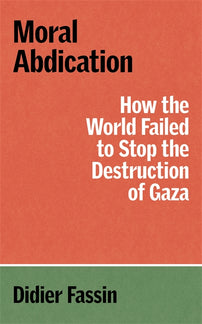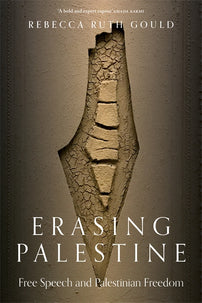Drops in an Ocean?
In light of his case against the Council for British Research in the Levant (CBRL), Palestinian American scholar Toufic Haddad reflects on political repression of pro-Palestinian voices .

From 1 to 4 July, a British Employment Tribunal will hear the case of “Haddad vs the Council for British Research in the Levant (CBRL)”. At a virtual hearing open to the public, the Tribunal will determine whether UK courts or those of the apartheid state of Israel are the appropriate jurisdiction for this case.
I am a Palestinian American academic, whose family hails from Jerusalem. This hearing represents my attempt to secure a modicum of justice after being terminated from my position as Director of CBRL’s Jerusalem branch (the Kenyon Institute) in the wake of the October 7th attacks and Israel’s subsequent genocidal campaign against Gaza.
CBRL justified my termination as a necessary redundancy that arose in light of a funding cut from its principal funders, the British Academy, which became effective at the end of March 2024. CBRL also shuttered the Kenyon Institute at this time based on a similar justification.
I wrote about the background to this case and the escalating measures to silence and remove me from my position in a November 2024 Verso blog post.
This post is intended as a follow up to that article, adding new information on my case, while reflecting on the broader struggle to obtain justice at this time and through this means.
The imminent July hearing to determine jurisdiction offers an opportunity to provide important testimony, evidence and arguments to establish the grounds for the future trial.
I am represented in this case by barrister Franck Magennis from Garden Court Chambers, as well as the European Legal Support Center (ELSC) who are acting as my solicitors. I warmly invite the general public and journalists to attend this hearing, which will take place online from London – our campaign will release details of how to attend virtually at the appropriate time.
***
In the broader context of global developments that seem to inch closer every day to the slippery slope of World War III, and with the disgrace of the Western-backed Israeli genocide continuing in the Gaza Strip, my case may seem little more than a drop in an ocean.
Indeed, there are untold numbers of Palestinian academics, students and workers, Palestine studies scholars, and Palestine solidarity activists who have had their lives turned upside down in the context of this repression.
This past May, the European Legal Support Centre (ELSC) released a database documenting 766 incidences of anti-Palestinian repression in Germany alone, with the intention to “expose how different actors and mechanisms contribute to the repression of Palestine solidarity in the region, revealing the broader system of European complicity in Israel’s crimes.” ELSC intends to expand the database to include incidences in other European contexts including the Netherlands and the UK.
In February, Liberty Investigates released its own report documenting 113 students and staff who were facing disciplinary action regarding their ‘pro-Palestine’ activism on 28 different UK campuses.
To my knowledge, no equivalent study of developments in US academia has been conducted, although the repression taking place there is widely known, systematic, and unapologetically linked to “Project Esther”, the Heritage Foundation’s anti-Palestine campaign shamelessly advanced as an effort to “combat antisemitism”, and functionally adopted by the US government. These measures have elicited widespread criticism from Palestinian groups and legal defense organisations, human and civil rights groups, unions and even the liberal media.
While these studies, articles and datasets provide a glimpse into the shocking extent of the phenomenon of anti-Palestinian repression, they still fail to capture the full scale of the crisis. Repression also takes place through informal means that are hidden and difficult to trace and enumerate. Indeed, it seems likely that the majority of anti-Palestinian repression takes place in this way and arises through (mis)understandings and biases – sometimes disclosed, oftentimes not – which exist in ‘upstream’ contexts, and often amongst members of privileged social classes or interest groups. Such understandings, decisions and biases play an important, albeit largely invisible, role in marginalising Palestinian voices and those in solidarity with them, with such approaches structuring downstream work environments, where repression is normalised through bureaucratic doublespeak and its capillaries. This is not a conspiracy, but rather a realpolitik history of how forms of racism and ideological and political bias can permeate institutions – as took place in the Jim Crow South or post-War McCarthyism. Palestine today is one of these issues.
Irrespective of its formal or informal nature, all of the repression taking place today around Palestine has qualitative corrosive repercussions upon core features of what was once thought to be the bedrock of liberal democratic praxis – namely: principles of academic freedom, the right to organise and protest, and the right to free speech.
In this regard, the attempted repression of the Palestinian solidarity movement acts as the tip of the spear of broader reactionary agendas and practices to which Western states and institutions are resorting in the chaos and toxicity of post-neoliberal, Western declinism. This swampy dystopia is marked by several malaises of different orders and is typified by the horrific narcissistic spectacle of Trump’s relentless political antics which capture the ‘political’ vacuity of the cowardly new world order we now inhabit.
With this said, the battle is far from over. The incredible global protest movement to end the Gaza genocide, to hold its perpetrators accountable – from the pursuit of individual war criminals to efforts to implement BDS across the public, private and charitable sectors, in an effort to fundamentally defend and uphold basic principles of humanity, solidarity, justice and freedom – this movement remains alive and indeed continues to grow.
Though its features and challenges surely vary in each context, while understandably undergoing various ebbs and flows, the broader trend is unmistakable: the movement demonstrates tenacious vivacity marked by tens of millions of people actively engaged and organising to push back against the horrific zeitgeist that attempts to perpetuate and fuel this genocide. Moreover, this movement continues to test new frontiers and means where efficacy and traction can be found on the path to realising its goals.
For those of us who (now) reside in Western supposed liberal states where judiciaries still formally retain the right to adjudicate matters of legality and public ethics – not personal writ, as Trump would apparently like to revive – the judicial system of Courts remain an important battleground where the successes and failures of our movement are tested and inscribed.
In this regard, my legal team and I, together with my UCU union representatives, would like to use this opportunity to draw attention to the specificities of why my case matters, and how it incorporates important dimensions of many different struggles – political, historical, civil and legal, pertaining to academia and beyond.
I also encourage others to attempt to conceive and articulate their struggles within this broader calculus, so our movement can develop clearer sites and entrance points where collective action can more effectively chip away at the edifice of barbarity that has made the Gaza genocide possible. Indeed, the fear is that what happens in Gaza is a prelude of more horrors to come both in Gaza and beyond, if it is not effectively countered domestically and internationally in the explosive, dystopian world rapidly unfolding before us. In that regard, let us remain focused and united as we work collectively to end the genocide in Palestine, realize freedom and justice there, and defend progressive values everywhere.
Afterall, in the end, drops combine to form streams, rivers and eventually oceans. Indeed, we may need an ocean to put out the fires of racism, fascism and oppression we have seen already unleashed in Gaza. So, drip, drip away… let it pour.
Read the full Statement of the Campaign for Justice in 'Haddad vs CBRL' here.
TH
30 JUNE 2025



